Virtual SIM Camp Assuages 8th through 12th Graders' Quarantine-Related Blues Via Fun and Intriguing Math Activities
August 21, 2020
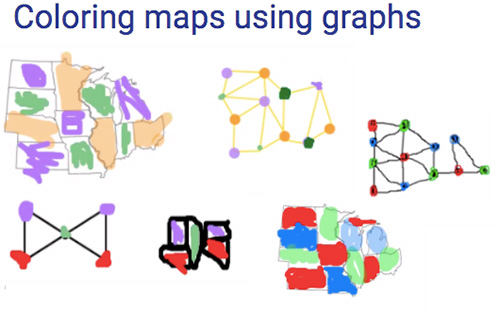
A student work sample; here the students colored maps using graphs, part of the "Counting, Coloring, and Graphs" lesson. (Image courtesy of Grace Jaffe.)
As with many disciplines that offer summer camps year-in, year-out on the Illinois campus, rather than not hold a camp due to COVID-19 quarantine mandates, Mathematics chose to modify the program of its established summer camp for 8th–12th grade students to hold the 2020 Virtual Summer Illinois Math (SIM) Camp. The camp ran for two separate sessions: Camp Epsilon, which hosted around 35 rising 8th–10th graders (ages 12–15) from June 8th–12th, and Camp Delta, which worked with around 25 rising 10th–12th graders (ages 15–18) from June 22nd–26th. Unlike some camps which specifically target girls, SIM Camp was open to any students who fit the age and grade criteria, regardless of gender identity.
The camp director for both sessions was Grace Jaffe, a fourth-year Math PhD student studying number theory, although she claims that last year’s director, Jenna Zomback, a fourth year Math grad student whose area of research is Descriptive Set Theory, “was an enormous help!”
Jaffe shares why she got involved with SIM camp—to pay it forward: “When I first started helping with camp last year, I was hoping to offer students the kind of encouragement and access to extracurricular mathematics that I'd received at their age, which was instrumental in helping me get to where I am now.”
Excited about working with the camp again this summer, she shares why she and the other SIM camp leaders chose to run the camp virtually: “When it became apparent we could not operate in person this year, I felt that our talented and dedicated staff could still offer a valuable camp experience in an online format.”
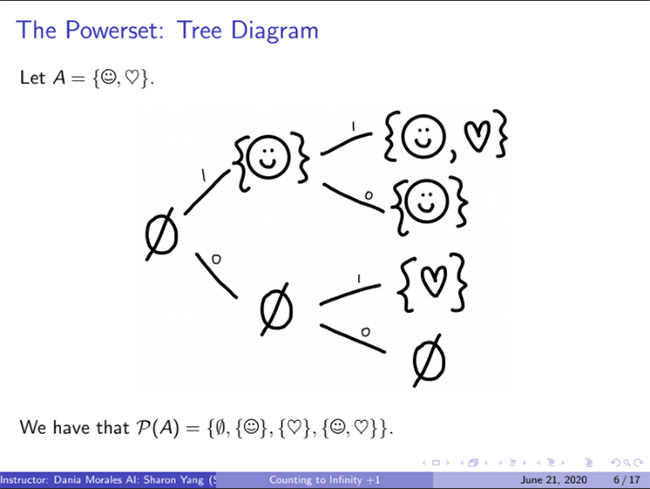
The Powerset Tree Diagram, one activity in the Counting to Infinity Plus 1 lessons. (Image courtesy of SIM website.)
However, accustomed to in-person, face-to-face interactions with campers, SIM camp staff faced the challenge of switching from a hands-on curriculum that at times employed physical movement to explain a math principle, to a more sedentary, on-line platform. Then, after tweaking the curriculum to fit a virtual format, they advertised the SIM Camp predominantly through Eweek and Facebook, with 48 students signing up for Camp Epsilon (about 35 regularly attended Zoom sessions) and 30 students registering for Camp Delta (about 25 regularly participated.)
Virtual SIM Camp activities addressed a number of math areas, and incorporated a variety of formats, including instructional videos, Zoom lectures, and group work in breakout rooms. Three SIM courses included: “Counting to Infinity (Plus One!)”; “Counting, Coloring, and Graphs”; and “Classical Constructions: Learn to Draw Algebra.”
For one activity, Paper Pentagons, part of the Classical Constructions: Learn to Draw Algebra course, a staff member recorded a YouTube video to guide students through the construction of paper pentagons; another staff member introduced the concept of abstract sets via emojis in a slideshow presentation; still another used GeoGebra Math Apps (free online math tools for graphing, geometry, 3D, and more) to craft an activity where students worked in small groups to explore planar and non-planar graphs.
In addition to the main areas emphasized, campers also tried other supplemental activities, such as:

Round Peg in a Square Hole by Tadashi Tokieda via Numberphile (the last activity in the Paper Crafts Supplemental Activity. Image courtesy of https://www.youtube.com/watch?v=AvFNCNOyZeE&feature=youtu.be.)
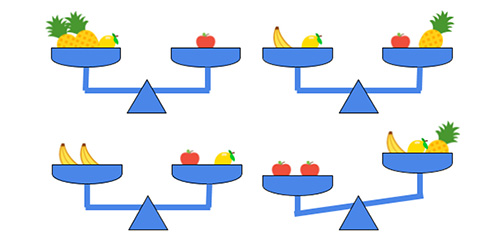
The Mixed Fruit Brainteaser. One activity included in the Brainteasers supplemental activity to the left goes like this: If all other scales are evenly balanced, what needs to be added to the right basket in the final set of scales on the bottom right so that it will be balanced too? There are two possible solutions. (Image courtesy of SIM Camp website.)
- Paper Crafts: Intriguing mathematical objects that could be made with just paper, scissors, and tape. Campers had access to YouTube videos about how to make: Möbius Activity 1, Möbius Activity 2, Pass Your Hand Through an Index Card, Pass Your Head Through an Index Card, and Round Peg in a Square Hole.
- The Mathematicians Project: If campers were to think of mathematicians, who did they think of? The Mathematicians Project might have made them rethink their answers.
- Spot the Pattern: In this activity, students figured out what patterns are, given the first several terms or rows. (OEIS, an online tool could be used to check their answers).
- Fun with Fractals: Students had an opportunity to learn about both fractals and GeoGebra in this interactive graphing project. Students were encouraged to cover several iterations, after watching this GeoGebra video introduction and these fractal construction directions.
- Two Truths and a Lie: A mathematical twist on an icebreaker game.
- Scavenger Hunt: Students hunted to find mathematical objects and concepts around their room, house, or neighborhood.
- Brainteasers: Campers were to untangle this collection of headscratchers, sticklers, and stumpers.
According to Jaffe, “One of SIM Camp's goals was to show students how interactive and hands-on math can be.”However, because of the virtual nature of the camp due to COVID-19, everyone would be behind a computer screen, thus making this difficult. But thanks to the generous support of the Mathematics Department, SIM Camp leaders were able to address this issue. They mailed a number of students supply kits containing glue sticks, colored pencils, graph paper, etc. which, according to Jaffe, definitely helped.
Regarding additional challenges related to the virtual nature of the camp, Jaffe reports, “Some students were not comfortable using the video or audio functions on Zoom, which is both perfectly understandable and a significant challenge to fostering a sense of community.” Plus, to rectify the issue of campers being hunkered down in front of their computers for long periods of time, she shares one of their strategies: “Additionally, we strongly encouraged students to stretch and step away from the computer for breaks and lunch, which are times students would normally get to socialize with each other and maybe play frisbee or cards on the quad.”
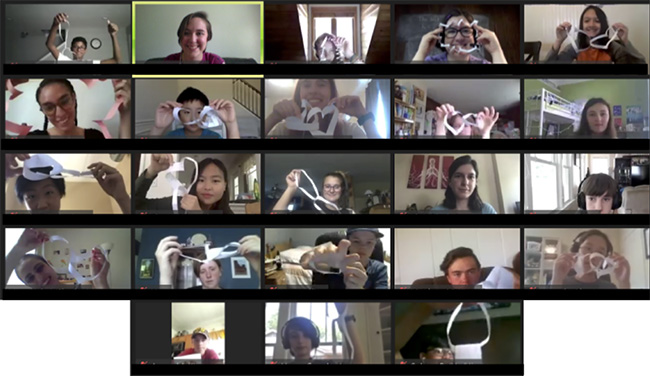
Students show off their worik as part of the Paper Craft supplemental activity.
While the virtual platform had a number of drawbacks, it also proved to be beneficial in other areas. For instance, Jaffe acknowledges that more diverse students was a plus.
“Being online was definitely frustrating for a lot of campers, but it also allowed students from different cities, states, and countries to participate, which we have never been able to accommodate before.”
For instance, the two sessions of SIM camp not only worked with students from all over Illinois; students participated from nearby Missouri, but also farther-away places: West Virginia, California, and Washington DC. In fact, this year’s SIM camp worked with international students—from as far away as India and Turkey.
Another plus about the virtual camp was that although it ended in June, campers (and non campers!) could keep doing SIM camp activities all the way through August…enough to keep kids occupied right up to the start of the fall school year.
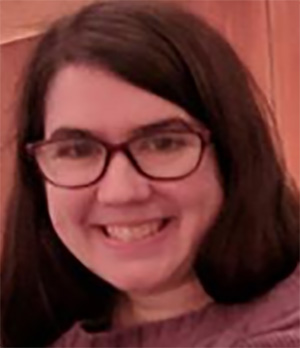
Grace Jaffe, SIM Camp Coordinator. (Image courtesy of Grace Jaffe.)
Regarding working past the end of SIM, the camp website stated: “SIM Camp 2020 has drawn to a close, but there’s still plenty of summer left! With that in mind, we are making certain camp materials available online for the months of July and August 2020.” Made available to campers were worksheets, videos, and slides for Counting to Infinity (Plus One!); Counting, Coloring, and Graphs; Classical Constructions: Learn to Draw Algebra; plus the various supplemental activities listed above. Anyone with an internet connection was welcome to access these materials, especially students who couldn’t attend SIM Camp or students who did attend camp but wanted to revisit certain activities or to explore a course not offered during the week they attended.
According to Jaffe, the camp had a positive impact on the participants. She states: “We had multiple campers express that they'd like to return to camp next year, that they had fun and learned a lot, and that they would recommend SIM Camp to a friend.”
It also appears that the camp provided some relief for quarantine-weary youngsters. Jaffe claims that for many students, “Camp might have been the first opportunity to socialize with other kids their age since schools closed. It was incredibly encouraging to see them connect with each other as they worked through problems and activities.”
Story by Elizabeth Innes, Communications Specialist, I-STEM Education Initiative. Photographs from Grace Jaffe unless otherwise noted.
More: 6-8 Outreach, 8-12 Outreach, Mathematics, Summer Camps, 2020
For additional Math articles, see:
- SIM Campers Experience “Ah-ha! Moments” Over the Beauty, Complexity, Oft-Misunderstood Nature...and Fun...of Mathematics
- IGL Links Central High Students to the More Knotty Aspects of Mathematic
- Illinois Geometry Lab: Changing the Shape of Math Research...and Outreach
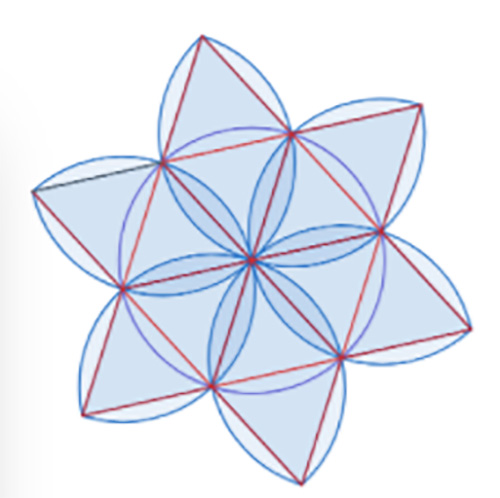
A camper submission: Hexagon Construction. (Image courtesy of Grace Jaffe.)
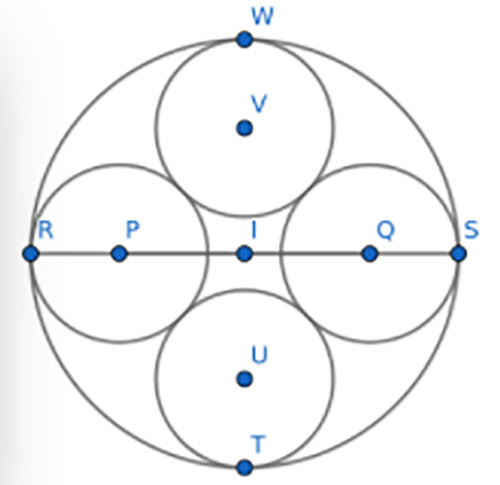
A camper submission: Four Circles. (Image courtesy of Grace Jaffe.)
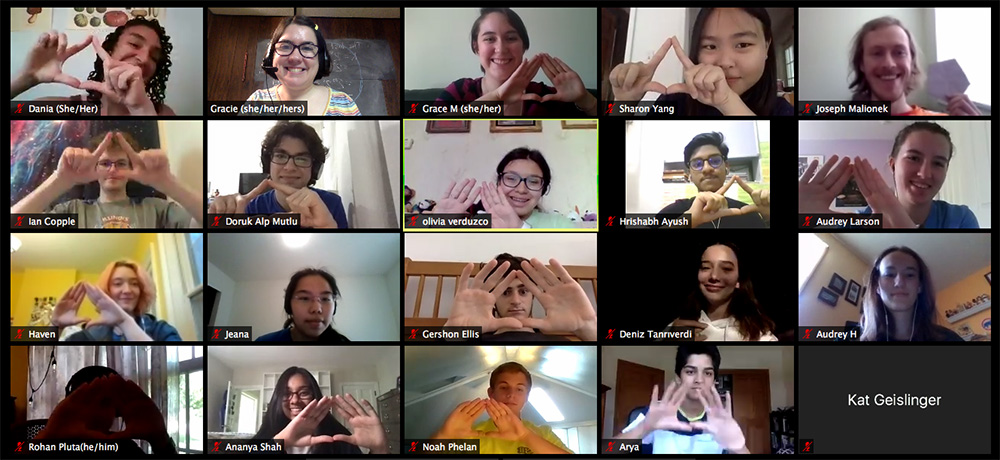
SIM Delta campers are holding up their hands to make a capital letter delta shape. (Image courtesy of Grace Jaffe.)













.jpg)
















